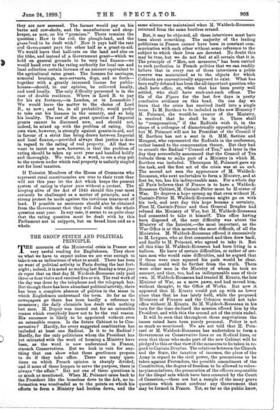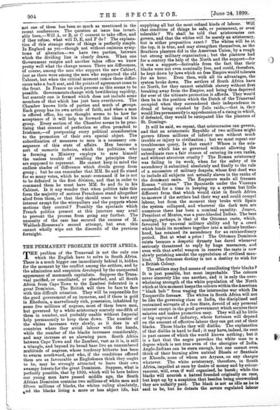THE GROUP SYSTEM AND POLITICAL PRINCIPLE. T HE accounts of the
Ministerial crisis in France are very useful reading for Englishmen. They show us what we have to expect unless we are wise enough to take t-oem as indications of what to avoid. There has been no want of political activity in Paris during the last fort- night; indeed, it is noted as making last Sunday a true jour de repos that on that day M. Waldeck-Rousseau only paid three or four visit s and received five or six. The real work of the day was done by the telephone and the telegraph boy. But though there has been abundant political activity, there has been a complete absence of politics in the sense in which Englishmen understand the term. So far as the newspapers go there has been hardly a reference to measures ; the daily chronicle has dealt with nothing but men, M. Dupuy was turned out for an ostensible reason which everybody knew not to be the real reason. His successor is likely to be appointed without even an ostensible reason. Is the future Cabinet to be Con- servative ? Hardly, for every suggested combination has included at least one Radical. Is it to be Radical ? Hardly, for the only politicians whom the President has yet intrusted with the work of forming a Ministry have been, as the word is now understood in France, staunch Conservatives. But we look in vain for any- thing that can show what these gentlemen propose to do if they take office. There are many ques- tions on which French opinion is sharply divided, and if none of these happen to serve the purpose, there is always "the affair." But not one of these questions is so much as mentioned. When M. Poincare came back to the President like the homeless dove to the Ark, no in- formation was vouchsafed as to the points on which his efforts to form a Ministry had broken down, and the same silence was maintained when M. Waldeck-Rousseau returned from the same bootless errand.
But, it may be objected, all these interviews must have been about something. The majority of the leading politicians in France cannot have been in constant com- munication with each other without some reference to the subject to which their lives are devoted. No doubt this may be true, but we do not feel at all certain that it is. The principle of "Men, not measures," has been carried to such perfection in French politics that we can readily believe that in every one of these interviews a polite reserve was maintained as to the objects for which Cabinets are conventionally supposed to exist. What has been really debated has been the all-important question who shall have office, or, when that has been pretty well settled, who shall have such-and-such offices. The file of the Figaro for the last few days is pretty conclusive evidence on this head. On one day we learn that the crisis has resolved itself into a single issue. Is M. Barthou to be included in the new Ministry ? M. Poincare, the would-be creator of the Ministry, is resolved that he shall be in it. There shall be "compensation," if the Radicals wish it, in the shape of a colleague of diametrically opposite principles ; but M. Poincare will not be President of the Council if M. Barthou has not a seat in it. MM. Sarrien and Mougeot, who represented the Radicals in the conference, rather leaned to the compensation theory. But they had to consult the Radical " Council of Ten," and later in the day they sorrowfully announced that the Council of Ten forbade them to make part of a Ministry in which M. Barthou was included. Thereupon M. Poincare gave up the task, and the first act of the crisis was at an end. The second act sees the appearance of M. Waldeck- Rousseau, who next undertakes to form a Ministry, and at first he, too, has his indispensable man. For a whole day all Paris believes that if France is to have a. Waldeck- Rousseau Cabinet, M. Casimir-Perier must be Minister of War. By degrees a hope sprang up that even without M. Casimir-Perier M. Waldeck-Rousseau might go on with his task, and next day this hope became a certainty. First M. Casimir-Perier and then General Brugere had refused the Ministry of War, but M. Waldeck-Rousseau had consented to take it himself. This office having been disposed of. the next difficulty was about the Ministry of the Interior,—the most important, as the War Office is at this moment the most difficult, of all the Ministries. M. Waldeck-Rousseau offered it successively to M. Leygues, who at first consented and then drew back, and finally to M. Poincare. who agreed to take it. But all this time M. Waldeck-Rousseau had been living in a balloon. He knew of certain difficulties, or rather of cer- tain men who would raise difficulties, and he argued that if these were once squared his path would be clear. Nothing could well be further from the truth. There were other men in the Ministry of whom he took no account, and they, too, had an indispensable man of their own. M. Waldeck-Rousseau had treated M. Krantz, the late Minister of War, as a mere pawn, and had moved him, without thought, to the Office of Works. But now it appeared that M. Krantz would put up with no lower place than that he has lately held, while the proposed Ministers of Finance and the Colonies would not take office without M. Krantz. So M. Waldeck-Rousseau in his turn for the time declined the mission offered him by the President, and with this the second act of the crisis ended.
It will be seen that throughout these negotiations the issues raised have been purely personal. Policy is not so much as mentioned. We are not told that M. Poin- care or M. Waldeck-Rousseau has undertaken to form a Government on Conservative lines or on R idical lines, or even that those who make part of the new Cabinet will be pledged to this or that view of the measures to be taken in re- gard to Captain Dreyfus. The relations between the Church and the State, the taxation of incomes, the place of the Army in regard to the civil power, the precautions to be taken against Pretenders, the possible amendment of the Constitution, the degree of freedom to be allowed to volun- taryiassociations, the prosecution of the officers responsible for the illegal acts which have been censured by the Court of Cassation,—these are but a sample of the many grave questions which must confront any Government that may be formed in France. Yet, so far as the public know, not one of them has been so much as mentioned in the recent conferences. The question at issue has invari- ably been,—Will A, or B, or C consent to take office, and if they refuse, what will D, E, and F do ? The explana- tion of this strange state of things is perfectly simple. In England as yet—though not without ominous symp- toms of alteration—we have two parties, between which the dividing line is clearly drawn. When one Government resigns and another takes office we know pretty well what the change means. There are differences, of course, among the men who support the new Cabinet, just as there were among the men who supported the old Cabinet. but when the critical moment comes these differ- ences take a back seat, and the points of agreement come to the front. In France no such process as this seems to be possible. Governments change with bewildering rapidity, but scarcely one is formed which does not include some members of that which has just been overthrown. The Chamber knows little of parties and much of groups. Each group has its own article of faith, and when a man is offered office, his one thought seems to be how far acceptance of it will help to forward the ideas of his group. Every section of the Chamber seems to be prac- tising that counsel of perfection so often preached to Irishmen,--of postponing every political consideration to the promotion of their own special object. The subordination of measures to men is a necessary con- sequence of this state of affairs. Men become a sort of raemoria technica, which the politician who is forming a Ministry employs to save himself the useless trouble of recalling the principles they are supposed to represent. He cannot keep in mind the endless shades of difference which divide group from group ; but he can remember that MM. So and So stand for so many votes, which he must. command if he is not to be defeated in the first division, and that in order to command them he must have MM. So and So in his Cabinet. Is it any wonder that when politics take this form the majority of serious Frenchmen stand altogether aloof from them, or that they should cease to have any interest except for the wirepullers and the puppets whose motions they control ? Possibly the spectacle which French politics present at this juncture may avail to prevent the process from going any further. The necessity of the case has secured the success of X. Waldeck-Rousseau's second attempt, but even this cannot wholly wipe out the discredit of the previous fortnight.



















































 Previous page
Previous page